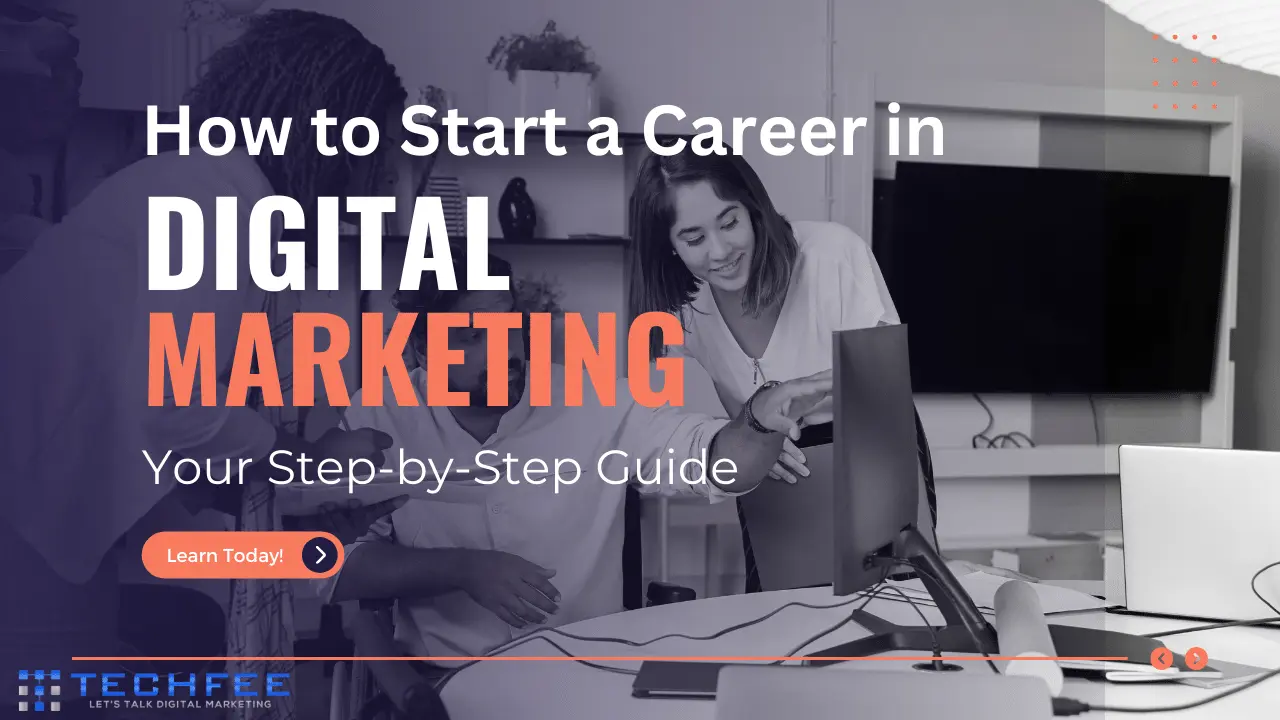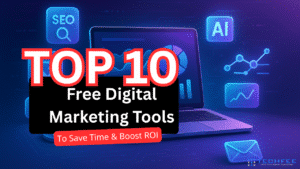A question that keeps coming up in the vast world of digital marketing is “How to get into digital marketing?”
This question speaks to people who want to be marketers, people who want to change careers, and marketing fans alike, drawing them into a world of endless possibilities and constantly evolving challenges.
We live in a fast-paced world where technology is a part of almost every part of our lives. This is why digital marketing is so important. The use of digital channels to promote and advertise goods, services, and companies is called digital marketing.
It has become an important part of doing business in the digital world. The most important thing about it is that it can reach and interact with people all over the world, regardless of time or place.
As we dive deeper into this ever-changing field, we’ll find out the secrets behind effective digital marketing strategies, from building a strong base to navigating the challenges and future trends that are always changing.
Let us show you the path to success in digital marketing. We’ll help newbies and seasoned pros through every step of this exciting journey.
What is a Digital Marketer?
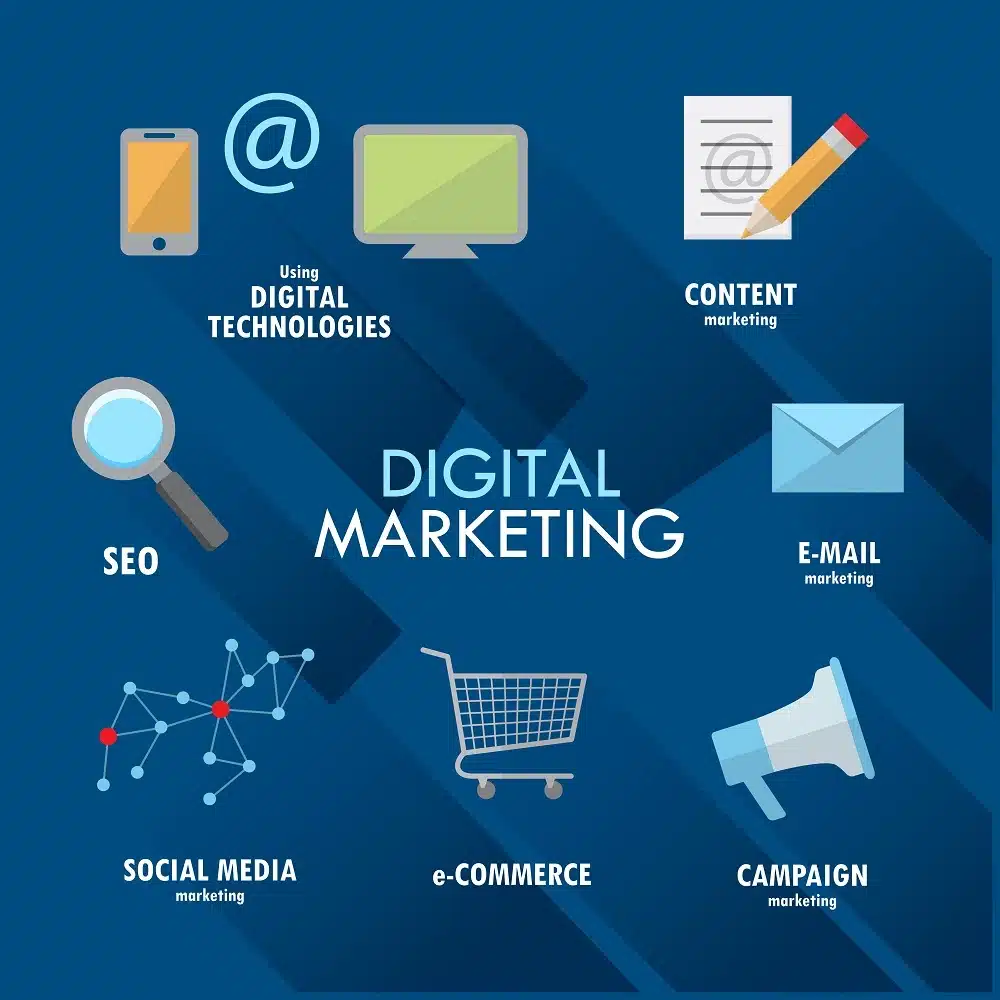
A digital marketer is a multifaceted professional who leverages digital channels and technologies to promote products, services, or brands.
They have many skills, including writing material, managing social media, search engine optimization (SEO), pay-per-click (PPC) advertising, email marketing, analytics, and more.
Digital marketers know how to create online campaigns that get people to click on them, interact with their target groups on various platforms, and analyze data to ensure that their marketing strategies have the most impact and return on investment.
In today’s highly linked world, they are the ones who make it possible for businesses to have a digital presence and be successful.
Understanding the Digital Landscape
Anyone who wants to succeed in digital marketing must know how the digital world works.
To effectively reach your target group, you need to have a full understanding of all the platforms and channels that are out there.
Each channel has its own chances and challenges, from search engines like Google and Bing to social media sites like Facebook, Instagram, and Twitter.
Marketers can learn about their demographics, behaviors, and preferences by thoroughly analyzing their target group. This lets them make campaigns that have the most impact possible.
Competitor analysis is just as important. This is where marketers look at their rivals’ strategies and tactics to learn more and find ways to stand out and improve.
By learning about these parts of the digital world, people who dream of becoming digital marketers can build a strong foundation for their efforts, making it easier for them to be successful from the start.
Building Your Digital Marketing Foundation
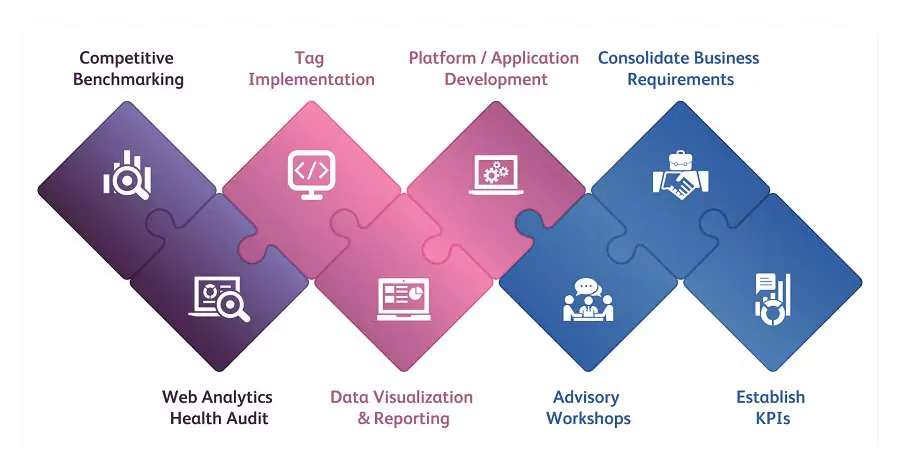
Building a strong base is important for anyone in digital marketing who wants to achieve, no matter how experienced they are.
Clear goals and targets help marketers get to real results and milestones by giving them a road map for success.
Setting SMART (specific, measured, achievable, relevant, and time-bound) goals is important whether you want to raise brand awareness, increase website traffic, or increase sales.
Making an interesting Unique Selling Proposition (USP) helps a company stand out from others by showcasing its special benefits and value to customers.
This means figuring out what makes the brand or product stand out and what the target crowd wants. Setting up Key Performance Indicators (KPIs) also helps marketers see how well their efforts are working and see how close they are to reaching their goals.
Choosing the right KPIs for things like website traffic, conversion rates, or social media activity keeps the focus on the things that really matter.
Marketers can start on the path to digital marketing success by setting clear goals, creating an attractive, unique selling proposition (USP), and identifying key performance indicators (KPIs). This will help them quickly go from beginners to experts.
How to Get into Digital Marketing with No Experience
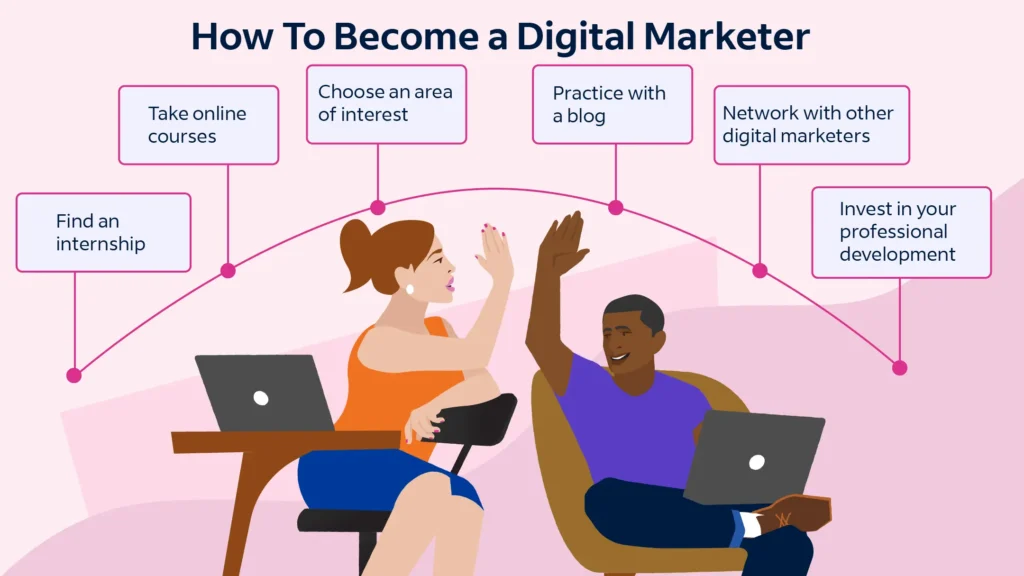
Pick a Specialty That Interests You
If this is your first time doing digital marketing, you should find a field that fits your interests and skills before you start.
Digital marketing includes many fields, such as social media management, email marketing, search engine optimization (SEO), pay-per-click (PPC) advertising, and more.
Spend some time learning about each field and think about what parts of them most interest you.
If you’re good at something, like writing interesting content, analyzing data, or making graphics that look good, choosing a field that interests you will not only make learning more fun, but it will also improve your chances of long-term success.
Build Your Foundational Knowledge
Now that you know what you want to specialize in, it’s time to start by learning digital marketing basics.
Start by learning the basics of marketing, like what branding is, how to divide your target crowd into groups, and how to map out the customer journey.
In addition, learn more about digital marketing-specific topics like social media algorithms, keyword research, content strategy, and conversion optimization.
Blogs, podcasts, webinars, and tutorials are just a few online tools that can help you learn more.
Set aside time every day to learn and take in new information. This will help you become more knowledgeable in your chosen field over time.
Take a Course or Get a Certificate
Self-study can be very helpful, but going to school for classes or a certification program can give you organized learning and credentials that will look good on your resume.
In the area of digital marketing, look for online courses or certification programs that well-known institutions or groups teach.
Most of the time, these classes cover a lot of different topics. To help you learn more and get better at using what you’ve learned, they may include hands-on activities, case studies, and tests.
You’ll not only learn useful things, but you’ll also get a certificate or credential that shows how dedicated you are to learning digital marketing and how good you are at it. This will make you more appealing to possible employers.
Build a Digital Marketing Portfolio
Building an extensive portfolio of your work is one of the best ways to show off your digital marketing skills and knowledge, especially if you are just starting out.
You can show off your skills by making sample ads, content pieces, social media posts, SEO analyses, or email newsletters, even if you haven’t worked on paid projects before.
Make mock-ups or prototypes using free platforms and tools, and don’t forget to list any related coursework, certifications, or personal projects you’ve finished.
A well-organized portfolio not only shows what skills you have, but it also lets possible employers see how creative, detailed, and good at solving problems you are.
Network Online and In-Person
If you want to move up in your digital marketing job, networking is very important, especially if you have no experience.
Join digital marketing-related online communities, forums, and social media groups to meet other workers in the field, ask questions, and find out about new job openings and trends.
You should also go to local meetups, conferences, workshops, and networking events where you can talk to possible employers, mentors, and peers in person.
Building real relationships and connections within the digital marketing community is very important, and you should not underestimate its power.
These connections can help you a lot with your job by giving you support, advice, and chances.
Look for Agency and In-House Jobs
When you’re ready to start looking for a job, you might want to look at digital marketing firms or marketing teams inside companies.
These places give you useful hands-on training, the chance to work with different clients and projects, and chances to learn and move up.
Some entry-level jobs, like marketing assistant, social media coordinator, content writer, or SEO expert, don’t require experience, but they do offer training and guidance to help you learn the ropes.
Keep an eye on job boards, company websites, and professional networking sites to see if there are any openings that match your skills and interests.
When you apply, make sure that your cover letter and resume show how you can help the team.
Consider Related Jobs To Get Your Foot in the Door
If you’re having trouble getting a job in digital marketing right away, look into related jobs that could help you get to your ultimate work goal.
Some jobs, like marketing supervisor, administrative assistant, customer service rep, or sales associate, may not have anything to do with digital marketing directly, but they do offer skills that can be used in other fields and chances to gain experience that is useful.
Look for jobs that involve things like writing content, managing social media, analyzing data, or interacting with customers. Then, use these experiences to show that you’re qualified for digital marketing jobs when you apply for other jobs.
Get work experience for less money by freelancing
If you have no experience at all, freelancing can be a great way to get real-world experience and build your name in the digital marketing field.
On sites like Upwork, Freelancer, and Fiverr, you can bid on paid jobs like writing content, managing social media, designing graphics, or running digital advertising campaigns.
Freelancing may not pay much at first, but it gives you the chance to work with real people, improve your skills, and build a portfolio of successful projects over time.
As you get more experience and good feedback, you can slowly raise your prices to attract clients who are willing to pay more.
This can help you build a successful freelance job or move on to full-time work.
Customize Your Resume and Cover Letter for Each Job
When looking for digital marketing jobs, it’s important to tailor your resume and cover letter to each position and employer.
Pay close attention to the job description and standards and highlight the skills, experiences, and accomplishments that show you are qualified for the job.
Use words and sentences from the job posting to ensure your application passes through applicant tracking systems (ATS) and reaches hiring managers.
Also, make your cover letter unique by mentioning why you want the job, what you can bring to the table, and how your skills and experiences fit with the company’s values and goals.
A well-thought-out application that is tailored to the job can greatly improve your chances of getting an interview and, eventually, getting into the digital marketing field.
What is Needed to Become a Digital Marketer?
You need a lot of different skills and traits to be a great digital marketer. This is what you need broken down:
1. Knowledge of Digital Platforms: A digital marketer should know a lot about different digital platforms, like websites, search engines, social media, and email marketing. Understanding how these platforms work and how to use them for business is important.
2. Creation of material and Copywriting: In digital marketing, writing material that people want to read is important. This includes writing blog posts, posts for social media, email messages, ads, and more. Good editing skills can help you get your point across and convince people.
3. Analyzing and making sense of data: Digital marketing relies heavily on data to assess the effectiveness of efforts and make smart choices. To improve efforts and reach goals, you need to know how to use tools like Google Analytics and analyze data to find insights.
4. Search Engine Optimization: To ensure digital content ranks well in search engine results, you must understand how SEO works. This means knowing how to do topic research, on-page optimization, link building, and keeping up with changes to search engine algorithms.
5. Social Media Management: You need to know how to handle social media accounts on sites like Facebook, Twitter, Instagram, LinkedIn, and more. This means making content calendars, interacting with fans, running paid ads, and looking at metrics to see how well they’re doing.
6. Paid Advertising: To run successful paid ads, you need to know how to use Google Ads, Facebook Ads, and other advertising networks. You also need to know about targeting options, spending management, ad creatives, and optimization techniques to get the best return on investment (ROI).
7. Email Marketing: To build and maintain relationships with leads and customers, you need to know how to use email marketing tools and techniques. This includes making email campaigns, dividing people into groups, A/B testing, and looking at metrics for how well emails are doing.
8. Graphic Design Basics: You don’t have to know how to do basic graphic design, but it can help you make visually appealing content for your digital marketing. In this case, tools like Adobe Creative Suite or Canva can be useful.
9. Project Management: In digital marketing, you often have to handle a lot of campaigns and jobs at the same time. Being good at project management can help you stay organized, meet goals, and make sure that marketing campaigns are carried out well.
10. Adaptability and Continuous Learning: New technologies, trends, and algorithms are always changing the digital marketing world. To stay competitive in your area, you need to be able to adapt and be willing to keep learning and improving your skills.
To do well as a digital marketer, you need to have technical knowledge, creativity, the ability to think analytically, and the ability to change.
To be successful in this fast-paced field, you need to keep improving these skills and learning about new trends in the field.
How to Start a Career in Digital Marketing?
Getting into digital marketing as a job can be an exciting journey full of learning and growing opportunities.
Because the digital world is changing so quickly, there are many ways to get started in this exciting area.
Here are the seven digital marketing jobs:
Search Engine Optimization (SEO)
SEO experts make a website more visible in search engine results pages (SERPs) by researching keywords, optimizing pages on the site, and building links.
If you want to work as an SEO professional, you should learn about SEO best practices, how search engines work, and how to optimize websites for search engines.
Pay-Per-Click (PPC)
Pay-Per-Click (PPC) Campaign Managers run paid ad programs on sites like Google Ads and Bing Ads.
If you want to work in PPC, you should learn how to set up campaigns, bid on keywords, write ads, and analyze performance.
Getting certificates in this area, such as the Google Ads certification, can help people trust you more.
Optimization of the conversion rate (CRO)
CRO experts work to boost website sales by making landing pages, forms, and calls to action more effective.
Learn about user behavior, how to do A/B testing, and how to read data from analytics tools like Google Analytics and Hotjar to start your CRO path.
Social Media Marketing
Social media marketers come up with and carry out plans to get people to interact with them on sites like Facebook, Twitter, Instagram, and LinkedIn.
To begin, make a strong footprint on social media sites by learning how to create content, manage communities, and run social media ads and staying up to date on the sites’ algorithms and trends.
Email Marketing
Email marketers plan and send email programs to keep customers and nurture leads.
Start by learning the basics of email marketing, such as segmenting your list, designing emails, setting them up to send automatically, and tracking their success.
Learn how to use email marketing tools like HubSpot, Mailchimp, or Constant Contact.
Content Marketing
To attract and keep the attention of their target audiences, content marketers make useful and important content.
If you want to work in content marketing as a job, you should learn how to write SEO copy, tell stories, create content, and share content.
Potential companies can see how good you are at writing by looking at your portfolio, which should include samples of your work.
Influencer Marketing
Marketers who work with influencers to get their fans to buy things work together with influencers. Find special influencers who are relevant to your target audience. Learn about influencer marketing trends and rules. Practice negotiating and building relationships.
What To Expect from Entry-Level Marketing Jobs
Making your first steps into digital marketing can be exciting and hard. For first-time marketing jobs, here’s what to expect:
Gain a Foundational Understanding of Digital Marketing
Entry-level marketing jobs are a great way to learn the basics of digital marketing ideas and strategies.
You’ll learn about different marketing platforms, like SEO, PPC, social media marketing, email marketing, and content marketing, and how they all work together to reach marketing goals.
Endless Learning
In entry-level marketing jobs, you can expect to keep learning new things. There are a lot of new technologies, algorithms, and trends coming out all the time in the area of digital marketing.
Take advantage of training, workshops, webinars, and industry certifications that can help you grow as a professional and keep up with the latest developments.
Get Real-World Practice
As an entry-level marketer, you will often be involved in putting marketing campaigns and projects into action.
You’ll get useful experience that goes along with the theoretical knowledge you learn in school, whether you’re writing social media posts, researching keywords, or looking at campaign performance measures.
Processes and SOPs
For entry-level jobs, it’s common to have to follow the marketing team’s or the company’s standard operating procedures (SOPs).
This gives a structured framework for getting things done quickly and makes sure that marketing efforts are the same across all platforms.
Lots of Research and Data Entry
Be ready to do a lot of study and enter a lot of data as part of your first marketing job duties.
These jobs, like researching the market and competitors and putting together data for presentations and reports, help people make smart decisions and improve their campaigns.
Regular Teamwork and Observation
Entry-level marketers work closely with people from design, content, analytics, and other areas. You can look forward to brainstorming sessions, team meetings, and working on projects with other people.
These are opportunities to learn from more experienced workers while also sharing your own thoughts and ideas.
Build a Professional Network
With entry-level jobs, you can meet more people in the marketing business and build your professional network.
Go to events in your field, join online communities, and use sites like LinkedIn to meet with other marketers. Getting to know your peers, mentors, and influential people in your field can lead to future job chances and teamwork.
Autonomy Over Time
As you gain experience and prove your skills, you can expect to have more control over your jobs and projects.
Entry-level jobs allow you to show off your skills, energy, and willingness to take charge of projects. Eventually, this will help you get more freedom and responsibility on the marketing team.
What Tools Do Digital Marketers Use?
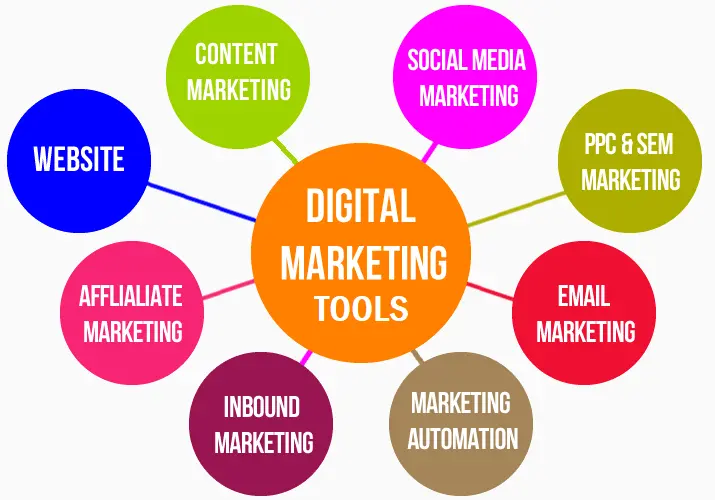
Digital marketers use a wide range of tools to make their work easier, look at data, and run successful campaigns across multiple platforms.
Here are some important types of tools that internet marketers often use:
SEO Tools
SEO tools are essential for better search engine rankings and making websites run faster. You can use tools like SEMrush, Ahrefs, Moz, and Google Search Console to find keywords, analyze backlinks, improve on-page SEO, and keep an eye on your search engine results.
These tools help digital marketers find chances for organic traffic growth and keep an eye on how well their SEO tactics are working.
Social Media Management Platforms
Social media management tools like Hootsuite, Buffer, Sprout Social, and Later are needed to schedule posts, manage multiple social media accounts, and analyze performance data.
These tools make it easier to create content and share it on different social media channels, helping digital marketers connect with their audience and monitor the success of their social media efforts.
Content Creation and Management Tools
Content creation and management tools help digital marketers quickly and easily create high-quality content and collaborate with their teams.
Platforms like Canva, Adobe Creative Cloud, and Grammarly make it easier to create attractive graphics, edit photos, and ensure that written content is correct in grammar.
Material management systems (CMS) like WordPress and HubSpot also make it easier to publish, organize, and optimize material for search engines (SEO).
Email Marketing Software
Email marketing software is needed to make and run email campaigns, automate work processes, and look at data for measuring how well emails are doing.
Email marketing tools like Mailchimp, Constant Contact, and HubSpot let you make email templates, divide email lists into groups, personalize messages, and keep track of open rates, click-through rates, and conversions.
Digital marketers can use these tools to keep leads interested, keep users, and get people involved through targeted emails.
Analytics and Reporting Tools
Analytics and reporting tools are very helpful for figuring out how well digital marketing is working and making choices based on data.
Platforms like Google Analytics, Adobe Analytics, and Data Studio give you a lot of information about how many people visit your website, how they behave, how many of them become customers, and how well your campaigns are doing.
These tools help digital marketers keep an eye on key performance indicators (KPIs), find places to improve, and show clients the return on investment (ROI) of their marketing efforts.
Future Trends in Digital Marketing
Digital marketing is always changing, so workers who want to do well in the field need to stay on top of new trends.
Take a look at these important digital marketing trends for the future:
Artificial Intelligence and Machine Learning
Machine Learning (ML) and Artificial Intelligence (AI) are changing digital marketing by making it possible to automate, personalize, and predict.
AI-powered tools can analyze huge amounts of data to learn useful things about customers’ actions, likes, and wants.
AI can help marketers optimize content, interact with chatbots, and set prices that change based on demand.
Computer programs that use machine learning can help improve targeting strategies, make ads work better, and give users more relevant experiences across all media.
Voice Search Optimization
Voice-activated devices like smart speakers and virtual assistants are becoming more and more common. This means that voice search optimization is becoming more and more important for digital marketers.
To show up in voice search results, you need to make sure your content is optimized for natural language queries and conversational search trends.
Long-tail keywords, local SEO, and giving short, relevant answers to voice questions are all things that marketers need to pay attention to.
Voice search is becoming more popular, so marketers will need to change their tactics to keep up with the times if they want to reach and engage with their audiences.
Augmented Reality Marketing
Augmented reality (AR) opens up exciting new ways to make marketing experiences more immersive and engaging.
Brands can use AR technology to make interesting campaigns that let people see goods in real life, try out virtual demos, and play games-like experiences.
AR-enhanced ads, mobile apps, and social media filters are all new and creative ways to get people to pay attention and interact.
As augmented reality (AR) technology gets easier to use and more popular, brands can use it to set themselves apart and give their customers unique brand experiences.
Staying Updated with Trends and Innovations
For digital marketers to stay ahead in an industry that is always changing, they need to keep up with the latest trends and products.
Here’s why it’s important to keep learning, follow stars in your field, and try out new strategies:
Importance of Continuous Learning
The area of digital marketing is always changing because technology is always getting better and people’s habits are always changing.
Marketers can keep up with new tools, trends, and best practices by learning new things all the time.
Spending time learning, like by going to workshops, taking online classes, or going to industry conferences, gives marketers the information and skills they need to adapt to changes and take advantage of new opportunities in the digital world.
Following Industry Leaders
Following thinking leaders and leaders in your field can help you understand the latest digital marketing trends, strategies, and ideas.
Marketers can follow experts’ blogs, podcasts, and social media accounts to stay current on new topics, case studies, and success stories.
When marketers learn from the experiences and knowledge of seasoned professionals, they can get ideas, new perspectives, and direction to improve their own plans and strategies.
Experimenting with New Strategies
In digital marketing, trying new things is the key to growth and new ideas. Marketers should be willing to try out new ideas, methods, and tools to see what works best for their customers and brings them results.
Experimenting is how marketers find new insights, improve their approach, and stay ahead of the competition.
They can do this by trying out new ad styles, new social media platforms, or cutting-edge marketing automation tools.
Adopting a culture of testing helps marketing teams be more creative and flexible and always look for ways to get better.
Conclusion
To sum up, going from being a beginner to an expert in digital marketing requires a variety of skills, including a deep knowledge of the digital world, a strong foundation built on ongoing learning, and the ability to adapt to new challenges and trends.
A lot of people who want to be successful as digital marketers do important things like getting hands-on experience, using industry tools, and keeping up with new trends.
However, being able to adapt may be the most important thing for long-term success in this fast-paced job. Digital marketing is always changing as new technologies, platforms, and customer habits come out.
People who can change their plans, turn when they need to, and be open to change will do well in this constantly shifting environment.
Now that you know how to start digital marketing, remember to stay interested, take action, and most of all, be flexible.
No matter where you start, you can find your way to success in digital marketing if you keep going and want to learn more.
Hopefully, I have answered the intent of “how to get into digital marketing.” Please comment below with your thoughts and subscribe to our email newsletter.
Frequently Asked Questions
What are the prerequisites for entering the field of digital marketing?
Prerequisites include a basic understanding of digital technologies, strong communication skills, analytical mindset, and willingness to learn continuously.
How long does it take to see results from digital marketing efforts?
Results vary based on factors like campaign objectives, budget, and competition. Generally, noticeable results can be seen within a few weeks to a few months.
What are some common misconceptions about digital marketing?
Misconceptions include it being easy or requiring no strategy, focusing solely on social media, and guaranteeing instant success.
How do I begin in digital marketing?
Start by gaining knowledge through online courses, practical experience through internships or freelancing, and building a strong online presence.
What are the biggest mistakes to avoid in digital marketing?
Common mistakes include neglecting audience targeting, ignoring analytics, not adapting to trends, and relying solely on one channel.
What qualification is required for digital marketing?
While a formal degree in marketing or related field can be helpful, it's not always necessary. Practical experience, certifications, and a strong portfolio can also be valuable.
Is MBA necessary for digital marketing?
No, an MBA is not necessary for digital marketing. Practical skills, industry certifications, and experience are often more relevant.
Can a 12th pass get a job in digital marketing?
Yes, individuals with a 12th pass qualification can enter digital marketing through relevant courses, certifications, and gaining practical skills.
What is the salary of a digital marketer?
Digital marketing salaries vary based on factors like experience, location, and job role. Entry-level positions may start around $30,000-$40,000 annually, while experienced professionals can earn significantly more.
Is digital marketing an IT job?
No, digital marketing is not strictly an IT job. While it involves using digital technologies, it primarily focuses on marketing strategies, content creation, data analysis, and customer engagement.
